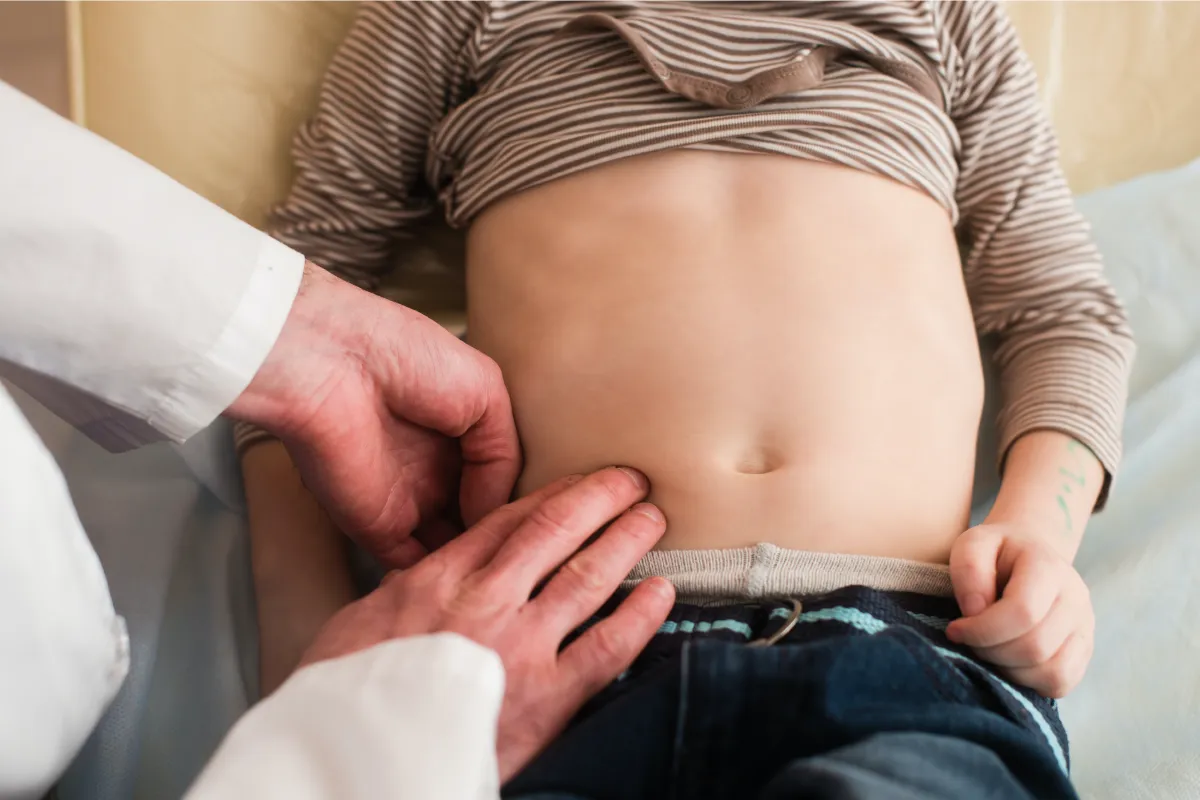Gastroenteritis, also called stomach flu, is a serious issue in kids. It can cause severe dehydration. This is a dangerous problem that needs quick treatment.
The World Health Organization says diarrheal diseases, like gastroenteritis, kill about 443,800 kids under five each year. We understand how serious this is and the importance of acting fast.

Dehydration happens when we lose more fluids than we take in. This messes up our body’s water and salt levels. Severe dehydration can be very bad. It can cause shock, organ failure, and even death.
Key Takeaways
- Gastroenteritis in children can lead to severe dehydration.
- Dehydration is a potentially life-threatening complication if not treated promptly.
- Diarrheal diseases cause an estimated 443,800 deaths annually in children under five.
- Severe dehydration can lead to shock, organ failure, and death.
- Timely medical intervention is key in treating gastroenteritis and avoiding complications.
Understanding Childhood Gastroenteritis and Its Causes
It’s important for parents and caregivers to know about gastroenteritis in kids. This condition, also known as the stomach flu, affects the stomach and intestines. It can be caused by viruses, bacteria, and parasites.

Viral Agents: The Primary Culprits in Pediatric Gastroenteritis
Viruses are the main cause of gastroenteritis in children. Rotavirus is a big problem, causing severe diarrhea and dehydration. It’s a big worry for young kids.
StatPearls says rotavirus is the top cause of gastroenteritis worldwide. It leads to millions of cases and thousands of hospital visits every year. Doctors say it’s a big health issue because of how serious it can be.
Other viruses, like norovirus and adenovirus, also cause gastroenteritis. Norovirus is known for spreading in places like schools and daycare centers.
Bacterial and Parasitic Causes in Toddlers and Infants
Bacteria and parasites also cause gastroenteritis in young kids. Salmonella and E. coli are common culprits. Parasites like Giardia lamblia are less common but can also cause problems.
Bacterial infections often come from bad food or water. This shows why keeping things clean and handling food safely is so important.
Common Signs and Symptoms of Gastroenteritis in Kids
The symptoms of gastroenteritis in kids can vary. But common signs include diarrhea, vomiting, fever, and belly pain. Spotting these early is key to managing the illness and avoiding dehydration.
Watch for signs of dehydration such as less urine, dry mouth, and feeling very tired. If you see these, get medical help right away.
Severe Dehydration: The Most Life-Threatening Complication
Severe dehydration is the most dangerous side effect of gastroenteritis in kids. It happens fast because they are small and lose water quickly. The World Health Organization says dehydration is a big killer in kids under five. This shows how important it is to act fast when dehydration happens.

How Dehydration Develops Rapidly in Children with Gastroenteritis
Dehydration happens when kids lose more water than they take in. This messes up their body’s water and salt levels. Children lose water fast because they burn energy quickly and have a big surface area for their size. They also lose a lot of water through vomiting and diarrhea, which are signs of gastroenteritis.
Young kids can’t tell us when they’re thirsty or drink enough water. So, it’s up to caregivers to watch how much water they drink. It’s key to spot dehydration signs early.
Why Infants and Toddlers Are Particularly Vulnerable
Infants and toddlers are more at risk of dehydration. Their kidneys are not fully grown, and they can’t control their body temperature well. Even a little water loss can cause big problems for them.
Also, they need others to give them water. So, it’s very important for caregivers to make sure they get enough water, even when they’re sick.
The Physiological Impact of Severe Fluid Loss
Severe dehydration can really mess with the body. It can make blood volume go down, which makes it hard for the heart to pump blood to important parts. This can lead to serious problems like shock or even death if not treated right away.
Dehydration also messes with salt levels in the body. This can affect how muscles and nerves work. It can cause seizures or heart problems.
5 Warning Signs of Dehydration in Pediatric Gastroenteritis
Dehydration is a serious issue in kids with gastroenteritis. Knowing the signs early can save lives. It’s important for parents and caregivers to watch for these signs to get help fast.
Mild Dehydration Indicators Parents Should Monitor
Mild dehydration is the first sign. Spotting it early can stop it from getting worse. Look out for:
- Dry mouth or lips
- Slightly decreased urine output
- Mild irritability or lethargy
StatPearls says dehydration is common in kids with gastroenteritis. This makes it key for parents to watch for these early signs.
Moderate Dehydration: When to Become Concerned
Moderate dehydration shows more obvious signs. We should worry if we see:
- Sunken eyes
- Decreased tear production
- More pronounced irritability or lethargy
- A dry, cool skin
At this point, getting medical help is critical to avoid further problems.
Severe Dehydration Symptoms Requiring Emergency Care
Severe dehydration is a true emergency. If a child shows signs like:
- Very dry mucous membranes
- No urine output for several hours
- Severe lethargy or unconsciousness
- A rapid heartbeat
We must get them to the hospital right away. Severe dehydration can be deadly if not treated quickly.
In summary, knowing the 5 warning signs of dehydration in kids with gastroenteritis is vital. Spotting these signs early helps ensure our kids get the care they need fast.
Other Serious Complications of Gastroenteritis in Pediatrics
Gastroenteritis in kids can cause more than just dehydration. Dehydration is a big worry, but other issues can affect the body too. These can impact how the body works.
Electrolyte Imbalances and Their Systemic Effects
Electrolyte imbalances are a big problem in kids with gastroenteritis. Losing important minerals like sodium, potassium, and chloride can mess with the body. These imbalances can cause muscle weakness, heart rhythm problems, and seizures. It’s important to watch electrolyte levels in kids with gastroenteritis.
Metabolic Acidosis: Causes and Consequences
Metabolic acidosis is a serious issue that can happen with gastroenteritis. It happens when the body loses too much bicarbonate or gets too much acid. This can cause fast breathing, confusion, and even coma in bad cases. We need to treat metabolic acidosis quickly to avoid lasting harm.
Hemolytic Uremic Syndrome Following Bacterial Gastroenteritis
Hemolytic uremic syndrome (HUS) can happen after bacterial gastroenteritis, such as E. coli. HUS is marked by blood problems, kidney issues, and low platelets. Quick action and care are key to managing HUS.
Rare but Serious Neurological Complications
There are also rare but serious brain problems that can happen. These include seizures, brain damage, and Guillain-Barré Syndrome. While these are rare, they need quick medical help to avoid lasting brain damage.
In summary, while dehydration is a big worry in kids with gastroenteritis, other serious problems can also happen. We must watch for these complications to give kids with gastroenteritis the best care.
The Global Burden of Childhood Gastroenteritis Complications
Childhood gastroenteritis complications are a big problem worldwide. This condition, which affects the stomach and intestines, is a major cause of sickness and death in kids. It has a big impact on children’s health, the healthcare system, and the economy.
Worldwide Statistics: 1.7 Billion Episodes and 443,800 Deaths Annually
The World Health Organization says diarrheal diseases, like gastroenteritis, cause 1.7 billion cases and 443,800 deaths in children under five each year. These numbers show how serious the problem is. We need to keep working to stop and treat gastroenteritis. This disease also makes many kids very sick, leading to repeated bouts of illness.
United States Impact: 200,000 Hospitalizations and 300 Deaths Yearly
In the U.S., gastroenteritis leads to about 200,000 hospital stays and 300 deaths in kids each year. These numbers are lower than worldwide figures, but are a big problem for healthcare and families. The cost of treating gastroenteritis in the U.S. is very high, affecting the economy.
Socioeconomic Factors Affecting Complication Rates
Socioeconomic factors greatly influence the risk and severity of gastroenteritis complications in kids. Access to clean water and sanitation is key, as bad hygiene and dirty water increase infection risk. Poverty, lack of education, and limited healthcare access also worsen the situation. We must tackle these issues to lessen the burden of childhood gastroenteritis worldwide.
- Limited access to clean water
- Inadequate sanitation facilities
- Poverty and socioeconomic disadvantage
- Lack of education on hygiene practices
Understanding the global impact of childhood gastroenteritis and its causes helps us find ways to fight this big health problem.
Treatment Protocols for Gastroenteritis in Children
Effective treatment is key to managing gastroenteritis in kids. It helps prevent dehydration and shortens symptoms. It also stops the infection from spreading.
Home Management of Mild Gastroenteritis in Toddlers
For mild cases, home care works well. Oral rehydration therapy (ORT) is the main treatment. It helps replace lost fluids and salts.
Parents can use special drinks from pharmacies or stores. It’s important to keep breastfeeding or formula feeding, too. The World Health Organization says ORT helps treat dehydration and shorten diarrhea.
“ORS is a simple, effective, and inexpensive way to treat dehydration caused by diarrhea.”
Medical Interventions for Moderate to Severe Dehydration
Children with severe dehydration need to see a doctor. Antiemetic medication helps control vomiting. Sometimes, IV fluids are needed to quickly rehydrate.
Doctors will decide the best treatment based on the child’s condition. For moderate dehydration, ORT can work, but close watch is needed.
Hospital Care for Life-Threatening Complications
Severe cases need hospital care. This includes severe dehydration, electrolyte imbalances, or hemolytic uremic syndrome. The hospital can provide close monitoring and IV fluids.
Medical studies show that quick treatment can save lives. “Early treatment of dehydration and electrolyte imbalances is critical,” say pediatric guidelines.
Conclusion: Preventing Fatal Outcomes in Pediatric Gastroenteritis
To stop fatal outcomes in kids with gastroenteritis, we need quick action and to keep them hydrated. The World Health Organization says keeping kids hydrated is key to saving lives. Knowing the causes, signs, and risks of gastroenteritis helps parents and doctors prevent serious problems.
Preventing gastroenteritis means watching for dehydration signs and getting help when needed. It’s critical to focus on preventing dehydration in sick kids. This way, we can lower the chance of fatal outcomes from gastroenteritis in children.
We aim to offer top-notch healthcare and support for international patients. Together, we can stop fatal outcomes in kids with gastroenteritis. This ensures children get the care they need to get better from this serious illness.
FAQ
What is the most serious complication of gastroenteritis in children?
What are the common causes of gastroenteritis in children?
What are the symptoms of gastroenteritis in kids?
How can dehydration be prevented in children with gastroenteritis?
What are the warning signs of dehydration in children?
When should I seek medical attention for my child with gastroenteritis?
What are the complications of gastroenteritis in children?
How is gastroenteritis treated in children?
What is the global impact of childhood gastroenteritis?
How can the risk of complications from gastroenteritis be reduced?
References
- Centers for Disease Control and Prevention. (2022). Vomiting and Diarrhea Illnesses (VDI): What You Need to Know. Retrieved from https://www.cdc.gov/vdi/index.html


































